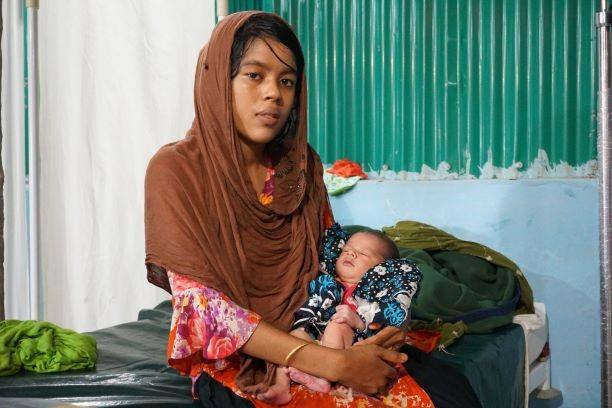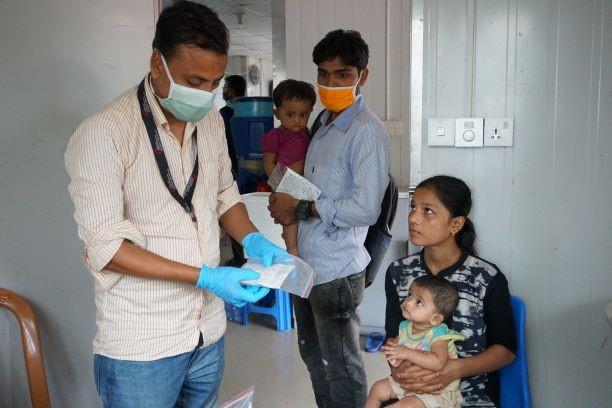Vaccines work for all but they are not reaching everyone equally in the world. Without vaccines, individuals and entire communities are at risk of serious illnesses and disability from diseases like measles, diphtheria, pneumonia, tuberculosis, Hepatitis B and polio.
Three years ago, on 25 August 2017, Cox’s Bazar registered the largest Rohingya influx yet. With no previous history of vaccination, the Rohingya people arrived in Cox’s Bazar with very low protection against vaccine-preventable diseases (VPD). Only two weeks later, with support from WHO, UNICEF and other partners the Government of Bangladesh organized the first measles-rubella vaccination campaign for Rohingya children.

Rohingya boy shows his vaccination card after taking his first vaccine ever. The first vaccination campaign reached more than 200,000 children - WHO Bangladesh/ Mehak Sethi
Hasina’s child is one-day-old and she hasn’t yet chosen the boy’s name. She is following a tradition in which a child is to be named seven days after birth. But when it comes to vaccines, she is not willing to wait that long.
“As a child I have never had a vaccine but throughout my pregnancy I followed all the vaccine recommendations”, tells 18-year-old Hasina less than 24h after her delivery at a health facility in Ukhia. “At first, we were all sceptical about vaccines but many people in my community are saying that children and pregnant women can’t miss one single vaccine”, she adds.

Newly married, Hasina is holding her first born. Today he got his vaccination card - WHO Bangladesh/ Tatiana Almeida
The young mother represents a new generation of Rohingya who became familiar with mass vaccination campaigns. In the past three years, the government with the support of WHO and health partners in Cox’s Bazar organized fifteen vaccination campaigns in response to communicable disease outbreaks including measles, polio, diphtheria and cholera.
As for children below two and pregnant women, the health care sector initiated routine immunization services to protect the newly arrived Rohingya from vaccine-preventable diseases (VPDs) with vaccination sites spread all across the camps and dedicated immunization teams monitoring progress. Despite all efforts, routine immunization coverage remains low among Rohingya and has further declined due to the impact of COVID-19 pandemic.
“In April, COVID-19 imposed restrictions and raised fears that impacted the immunization services in the refugee camps. Almost all outreach services were temporarily suspended and only a few immunization fixed sites continued their activities”, explains WHO Surveillance and Immunization Medical Officer (SIMO), Dr Sujit Paul.

Dr Sujit Paul has been working with WHO as a Surveillance and Immunization Medical Officer (SIMO) in Ukhia, Cox’s Bazar, since 2018 - WHO Bangladesh/ Tatiana Almeida
In response, WHO, the Government and a group of immunization experts developed a health facility-based transitional strategy to resume the routine immunization services.
Currently, 55 health facilities are working as immunization fixed sites and another 60 health facilities as outreach sites. Together, they provide routine immunization sessions in the Rohingya camps. More than 140 government vaccinators, supervisors and 20 Health Field Monitors were trained on Infection prevention and control measures for COVID-19 to enable the continuation of vaccines. WHO is also continuously monitoring VPDs through EWARS and active visits to priority health facilities.

Community Health Worker, Mohammed Faruk bringing children to a vaccination site in Ukhia - WHO Bangladesh/ Tatiana Almeida
“Jasmin is 9 months old and Juseifa is 8 months”, says Mohammed Faruk to the vaccinator. “She (points at Juseifa) is my niece and Jasmin is my neighbours’ child. Their parents couldn’t come today but I know that vaccines are important, so I offered to bring them”, he explains.
25-year-old Faruk is a very proactive member of the Rohingya community and his many contributions to improving health seeking among the refugees, especially since the beginning of the COVID-19 outbreak, are remarkable. He wanted to be a journalist or a writer; instead, he is communicating life-saving health messages. His story of resilience represents that of many Rohingya who - like him - want to write their own fate.
“I come from a very poor family in Myanmar. In 2015, we took loans from relatives and friends so I could go abroad, find a job and send money home. But 3 years later I was deported - those were the darkest days of my life. But do you know what my blessing was? I found my family right here, at the camps, when I had lost hope of ever seeing them again”.
Three years into the Rohingya emergency response in Cox’s Bazar, WHO continues to envision a world free of vaccine-preventable diseases and health and well-being for all Rohingya. Health is neither a privilege nor a choice, it is a human right.
